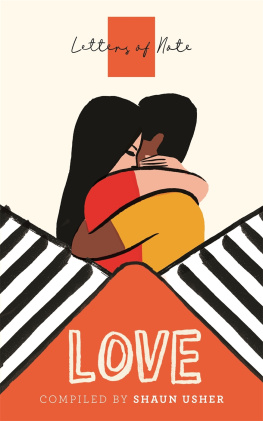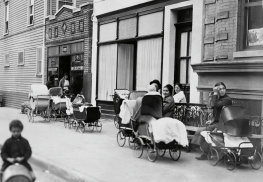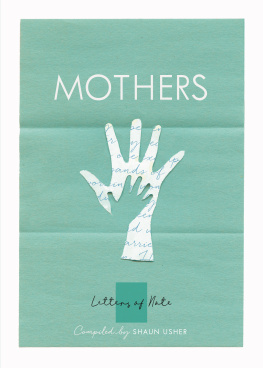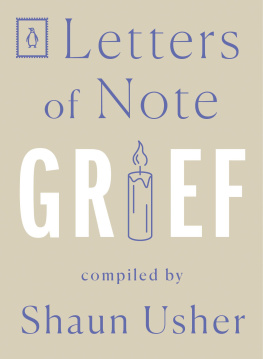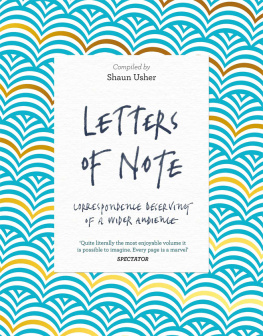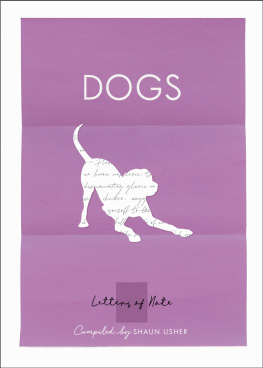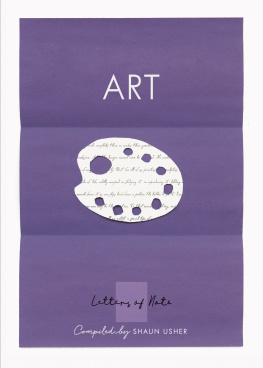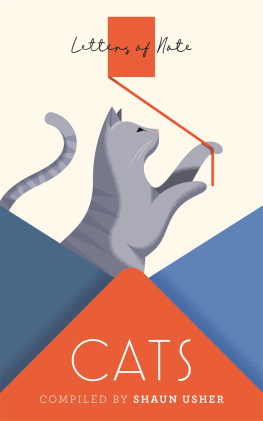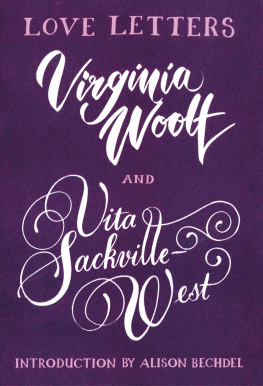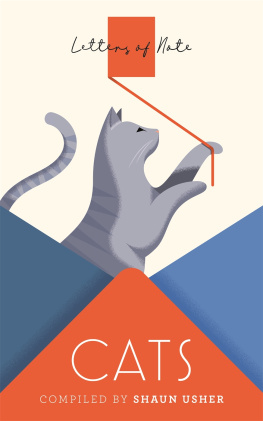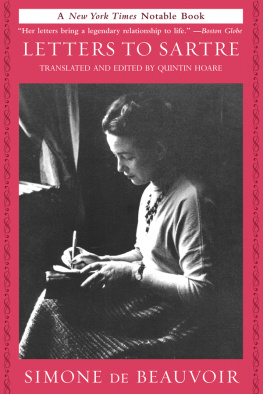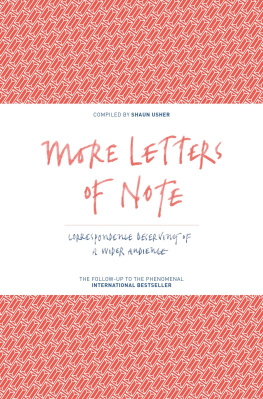
Letters of Note was born in 2009 with the launch of lettersofnote.com, a website celebrating old-fashioned correspondence that has since been visited over 100 million times. The first Letters of Note volume was published in October 2013, followed later that year by the first Letters Live, an event at which world-class performers delivered remarkable letters to a live audience.
Since then, these two siblings have grown side by side, with Letters of Note becoming an international phenomenon, and Letters Live shows being staged at iconic venues around the world, from Londons Royal Albert Hall to the theatre at the Ace Hotel in Los Angeles.
You can find out more at lettersofnote.com and letterslive.com. And now you can also listen to the audio editions of the new series of Letters of Note, read by an extraordinary cast drawn from the wealth of talent that regularly takes part in the acclaimed Letters Live shows.

For Karina
First published in Great Britain in 2020
by Canongate Books Ltd,
14 High Street, Edinburgh EH1 1TE
canongate.co.uk
This digital edition first published in 2020 by Canongate Books
Copyright Letters of Note Ltd
The right of Shaun Usher to be identified as the author of this work has been asserted by him in accordance with the Copyright, Designs and Patents Act 1988
For permission credits please see p. 130
British Library Cataloguing-in-Publication Data
A catalogue record for this book is available on request from the British Library
ISBN 978 1 78689 532 5
eISBN 978 1 78689 533 2
Typeset in Joanna MT 10.5/14 pt by
Palimpsest Book Production Ltd, Falkirk, Stirlingshire
CONTENTS
John Steinbeck to Thom Steinbeck
Simone de Beauvoir to Nelson Algren
Dorothy Freeman to Rachel Carson
Isaac Forman to William Still
Juliette Drouet to Victor Hugo
Vladimir Nabokov to Vra Slonim
Maud Gonne to W.B. Yeats
Simon Fallowfield to Mary Foster
Nadezhda Mandelstam to Osip Mandelstam
Zora Neale Hurston to Herbert Sheen
Marina Tsvetaeva to Rainer Maria Rilke
Ludwig van Beethoven to his Immortal Beloved
Anne Lindbergh to Charles Lindbergh
John Jay Chapman to Minna Timmins
Richard Feynman to Arline Feynman
Emilie Blachre to Rmi Ochlik
Mildred Loving to the American Civil Liberties Union
Addie Brown to Rebecca Primus
Robert Schumann to Clara Wieck
James Schuyler to John Button
Emmie to Sumner
Evelyn Waugh to Laura Herbert
Ansel Adams to Cedric Wright
Frida Kahlo to Diego Rivera
Lester Halbreich to Shirley Halbreich
Napolon Bonaparte to Josphine de Beauharnais
Nelson Mandela to Winnie Mandela
Johnny Cash to June Carter
Vita Sackville-West to Virginia Woolf
Sullivan Ballou to Sarah Ballou
A letter is a time bomb, a message in a bottle, a spell, a cry for help, a story, an expression of concern, a ladle of love, a way to connect through words. This simple and brilliantly democratic art form remains a potent means of communication and, regardless of whatever technological revolution we are in the middle of, the letter lives and, like literature, it always will.
INTRODUCTION
Nothing in life holds as much power as love. It is the force that binds us. In our darkest moments, during the toughest of times, the ever-present pull of love demands that we persevere and gives us the strength necessary to keep going. Indeed, consumed by love, connected to another human being at such a fundamental level, one feels ready and able to achieve anything; to overcome any obstacle that life would dare place in ones way; to fight to the death, if necessary, in an effort to protect all that is held close to ones heart.
Love, I would argue, is the nearest thing we have to a superpower. But with highs come lows, and a love that has soured can swiftly and without compromise bring someone to their knees, devastating the very life it once enriched. The unremitting, overwhelming pain that can fill the vacuum left by a love lost is unlike any other feeling, its effects almost impossible to articulate. It is life without colour. A movie with no sound. To fully surrender yourself to love is to lower all defences, and the fact that we continue to pursue love despite such enormous emotional risk is testament to its immeasurable benefits.
It is no surprise, then, that the letter, our most private form of communication, has proven to be such a popular medium through which to send and discuss love, a special something that is difficult to define on the page, despite being described by many as our only truly universal language. In this volume can be found a selection of letters that go some way towards illustrating our complex relationship with this alluring energy, including a letter of advice from parent to lovesick child, which contains words of wisdom surely valuable for people of all ages, and the letter that led to the striking down of a ban on mixed-race marriages in the United States, written by a lady with a surname so perfect as to be almost unbelievable. You will also read an acutely unromantic marriage proposal from 1866, which may induce tears of laughter and a long sigh of pity, and a desperate letter from a broken-hearted escaped slave to the man who helped him flee his master, in which he seeks assistance in finding his beloved wife. And, of course, you will find numerous examples of the trusty love letter letters to lovers, letters to the dead, letters unsent a form of correspondence with no modern equivalent, and a flavour of letter to which millions of people, myself included, owe so much.
It was in September of 2002 that my obsession with letters first reared its head, provoked by a long-distance correspondence with a new friend who had no option but to move hundreds of miles away and set up home, albeit for just ten months. The phrase social media was yet to be uttered, and at that point in time, email still seemed exotic, so our decision to keep in touch by old-fashioned letter sounded almost normal. What we had not anticipated was just how enjoyable and insightful those letters would be, and how perfect a start our blossoming relationship had been given.
Karina and I married in 2012. This book is for her.
Shaun Usher
2020
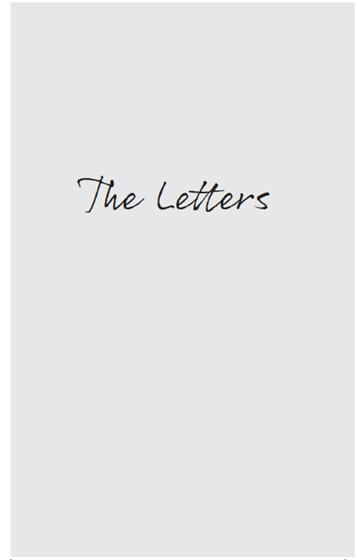
LETTER 01
NOTHING GOOD GETS AWAY
John Steinbeck to Thom Steinbeck
10 November 1958
Born in California in 1902, John Steinbeck remains a giant in the world of fiction thanks to his classic novels The Grapes of Wrath, East of Eden and Of Mice and Men. Additionally, when he reached sixty, his standing was further cemented when he was awarded the Nobel Prize for Literature, an honour bestowed on so few. As was the case with most authors in the 1950s, Steinbeck was a keen letter writer who enjoyed the to and fro: he kept up correspondence with all manner of people, from fellow authors through to US presidents, with effortless style. In 1958, four

